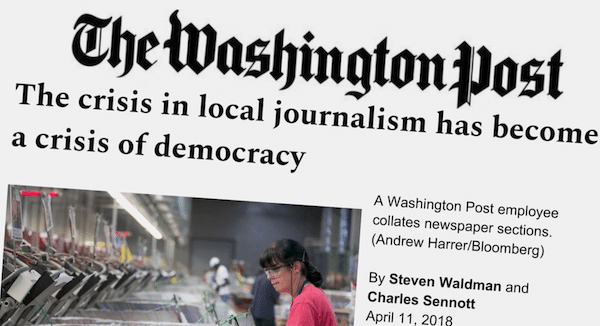Stripped for Parts: American Journalism on the Brink is the story of a secretive hedge fund that is plundering what is left of America’s newspapers, and the journalists who are fighting back.
This film makes its world premiere at the Santa Fe International Film Festival on Saturday, Oct. 21, 2023, with more regional premieres to follow at the United Nations Association Film Festival in Palo Alto, Double Exposure in Washington D.C., and the St. Louis International Film Festival. And more to follow!
Directed by: Rick Goldsmith
Produced by: Rick Goldsmith and Lauren Kawana
THE STORY
In 2011, a Wall Street hedge fund, Alden Global Capital, started buying up chains of newspapers nationwide. Alden found a way to profit from distressed industries, but the effects on the newspapers’ journalism were disastrous.
In 2015, reporter Julie Reynolds began investigating this hedge fund that had bought her own small-town daily along with more than 100 other newspapers nationwide. She exposed how these self-described “vulture capitalists” would strip the newspapers of their real estate, gut their newsrooms and run away with the profits. Reynolds’ reporting reached The Denver Post’s Chuck Plunkett, whose subsequent editorial criticizing Alden would trigger the “Denver Rebellion.”
Much has been written about the precipitous decline in local journalism. Our film takes it one step further: “Yes, journalism is in crisis, but what are we doing about it?”
Stripped for Parts interweaves three tales: 1) A nuts-and-bolts portrayal of investigative reporting, as Reynolds peels back layers of Alden’s deception and heartless profiteering; 2) The damage that newspaper ownership by hedge funds—with no experience nor interest in journalism—inflicts on hundreds of communities nationwide; and 3) the David-and Goliath battle waged by a handful of journalists—in Colorado, California, Chicago and elsewhere—to prevent the destruction of their newspapers, to educate the public about what is at stake, and to create new vehicles to preserve, and improve, the vitality of local journalism.
Ours is a cautionary tale: What is lost when billionaires with no background nor interest in a civic mission, who are only concerned with profiteering, take over our most influential news organizations? What new models of news gathering and dissemination show promise for our increasingly digital age? What can the public do to preserve and support vibrant journalism? Stripped for Parts addresses these questions and more. “Democracy dies in darkness” and the stakes could not be higher.
Why this film now? Why us?
We are living through a time where journalism is taking it on the chops. The business model of newspapers—still the largest source of news by far, even in this digital age—is faltering, due to many things, including the loss of advertising to Facebook and Google, the changing way that people seek out news, and other challenges presented by the digital age. But, unknown to many, capitalist greed is also to blame. This is the heart of our story.
When Alden Global Capital and its founders, Randall Smith and Heath Freeman, started gobbling up newspapers in 2011, their profiteering model and intentions were largely unknown, even to the journalists who worked at their newspapers. Now, largely due to the reporting and events covered in our documentary, Alden is widely perceived, and labeled, as “the destroyer of newspapers.”
Alden continues its march to swallow up newspapers. Since 2018’s Denver Rebellion, our film team has followed Alden’s continuous takeover attempts of the entire Gannett chain (USA Today and others), The Tribune Company and (currently) Lee Enterprises.
Exposure by journalists, activism by their union The NewsGuild, and growing public opposition have foiled Alden Global’s attempts at times. But some takeover attempts succeed, as happened last year with The Tribune Company and its flagship The Chicago Tribune. Who will win these battles, Wall Street “vulture capitalists” who profit from newspapers’ destruction, or those concerned with the health of their communities and the people’s right to know?
Journalism is all-important, especially today. It connects and unites communities. At its best it comforts the afflicted, afflicts the comfortable and tells truth to power. When robust, it is the lifeblood of democracy.
Journalists are our everyday heroes: exposing secrets, uncovering abuses, and giving us better understanding of our communities, cultures, politics, world. Vigorous journalism is essential to our lives. Let’s help save it.

